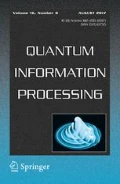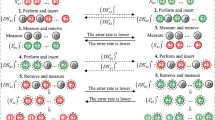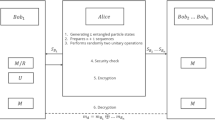Abstract
Semiquantum communication permits a communication party with only limited quantum ability (i.e., “classical” ability) to communicate securely with a powerful quantum counterpart and will obtain a significant advantage in practice when the completely quantum world has not been built up. At present, various semiquantum schemes for key distribution, secret sharing and secure communication have been proposed. In a quantum dialogue (QD) scenario, two communicants mutually transmit their respective secret messages and may have equal power (such as two classical parties). Based on delegated quantum computation model, this work extends the original semiquantum model to the authenticated semiquantum dialogue (ASQD) protocols, where two “classical” participants can mutually transmit secret messages without any information leakage and quantum operations are securely delegated to a quantum server. To make the proposed ASQD protocols more practical, we assume that the quantum channel is a collective noise channel and the quantum server is untrusted. The security analysis shows that the proposed protocols are robust even when the delegated quantum server is a powerful adversary.


Similar content being viewed by others
References
Nguyen, B.A.: Quantum dialogue. Phys. Lett. A 328(1), 6–10 (2004)
Shi, G.F., Xi, X.Q., Hu, M.L., Yue, R.H.: Quantum secure dialogue by using single photons. Opt. Commun. 283(9), 1984–1986 (2010)
Luo, Y.P., Lin, C.Y., Hwang, T.: Efficient quantum dialogue using single photons. Quantum Inf. Process. 13(11), 2451–2461 (2014)
Gao, G.: Two quantum dialogue protocols without information leakage. Opt. Commun. 283(10), 2288–2293 (2010)
Shen, D., Ma, W., Yin, X., Li, X.: Quantum dialogue with authentication based on bell states. Int. J. Theor. Phys. 52(6), 1825–1835 (2013)
Thapliyal, K., Pathak, A.: Applications of quantum cryptographic switch: various tasks related to controlled quantum communication can be performed using Bell states and permutation of particles. Quantum Inf. Process. 14(7), 2599–2616 (2015)
Banerjee, A., Shukla, C., Thapliyal, K., Pathak, A., Panigrahi, P.K.: Asymmetric quantum dialogue in noisy environment. Quantum Inf. Process. 16(2), 49 (2017)
Sharma, V., Thapliyal, K., Pathak, A., Banerjee, S.: A comparative study of protocols for secure quantum communication under noisy environment: single-qubit-based protocols versus entangled-state-based protocols. Quantum Inf. Process. 15(11), 1–30 (2016)
Yang, C.W., Hwang, T.: Quantum dialogue protocols immune to collective noise. Quantum Inf. Process. 12(6), 2131–2142 (2013)
Yang, C.W., Tsai, C.W., Hwang, T.: Fault tolerant two-step quantum secure direct communication protocol against collective noises. Sci. China Phys. Mech. Astron. 54(3), 496–501 (2011)
Ye, T.Y.: Robust quantum dialogue based on the entanglement swapping between any two logical Bell states and the shared auxiliary logical Bell state. Quantum Inf. Process. 14(4), 1469–1486 (2015)
Ye, T.Y.: Quantum secure direct dialogue over collective noise channels based on logical Bell states. Quantum Inf. Process. 14(4), 1487–1499 (2015)
Bin, G.U., Zhang, C.Y.: Robust quantum secure direct communication with a quantum one-time pad over a collective-noise channel. Sci. China Phys. Mech. Astron. 54(5), 942–947 (2011)
Ye, T.Y.: Fault-tolerant authenticated quantum dialogue using logical bell states. Quantum Inf. Process. 14(9), 3499–3514 (2015)
Li, X.H., Deng, F.G., Zhou, H.Y.: Efficient quantum key distribution over a collective noise channel. Phys. Rev. A 78(2), 022321 (2012)
Li, X.H., Zhao, B.K., Sheng, Y.B., Deng, F.G., Zhou, H.Y.: Fault tolerant quantum key distribution based on quantum dense coding with collective noise. Int. J. Quantum Inf. 7(08), 1479–1489 (2010)
Boileau, J.C., Gottesman, D., Laflamme, R., et al.: Robust polarization-based quantum key distribution over a collective-noise channel. Phys. Rev. Lett. 92(1), 017901 (2004)
Wang, X.B.: Fault tolerant quantum key distribution protocol with collective random unitary noise. Phys. Rev. A 72(5), 762–776 (2004)
Kwiat, P.G., Berglund, A.J., Altepeter, J.B., White, A.G.: Experimental verification of decoherence-free subspaces. Science 290(5491), 498–501 (2000)
Walton, Z., Abouraddy, A.F., Sergienko, A., Saleh, B., Teich, M.: Decoherence-free subspaces in quantum key distribution. Phys. Rev. Lett. 91(8), 087901 (2003)
Boyer, M., Kenigsberg, D., Mor, T.: Quantum key distribution with classical bob. Phys. Rev. Lett. 99(14), 140501 (2007)
Boyer, M., Gelles, R., Kenigsberg, D., Mor, T.: Semiquantum key distribution. Phys. Rev. A 79(3), 032341 (2009)
Zou, X., Qiu, D., Li, L., Wu, L., Li, L.: Semiquantum-key distribution using less than four quantum states. Phys. Rev. A 79(5), 1744–1747 (2009)
Wang, J., Zhang, S., Zhang, Q., Tang, C.J.: Semiquantum key distribution using entangled states. Chin. Phys. Lett. 28(10), 100301 (2011)
Yu, K.F., Yang, C.W., Liao, C.H., Hwang, T.: Authenticated semi-quantum key distribution protocol using bell states. Quantum Inf. Process. 13(6), 1457–1465 (2014)
Zou, X., Qiu, D., Zhang, S., Mateus, P.: Semiquantum key distribution without invoking the classical partys measurement capability. Quantum Inf. Process. 14(8), 2981–2996 (2015)
Zou, X.F., Qiu, D.W.: Three-step semiquantum secure direct communication protocol. Sci. China Phys. Mech. Astron. 57(9), 1696–1702 (2014)
Zhang, M.H., Li, H.F., Xia, Z.Q., Peng, J.Y., Peng, J.Y.: Semiquantum secure direct communication using epr pairs. Quantum Inf. Process. 16(5), 117 (2017)
Luo, Y.P., Hwang, T.: Authenticated semi-quantum direct communication protocols using bell states. Quantum Inf. Process. 15(2), 947–958 (2016)
Shukla, C., Thapliyal, K., Pathak, A.: Semi-quantum communication: protocols for key agreement, controlled secure direct communication and dialogue. Quantum Inf. Process. 16(12), 295 (2017)
Lu, H., Cai, Q.: Quantum key distribution with classical alice. Int. J. Quantum Inf. 06(06), 1195–1202 (2009)
Krawec, W.O.: Mediated semi-quantum key distribution. Phys. Rev. A 91(3), 032323 (2014)
Childs, A.M.: Secure assisted quantum computation. Quantum Inf. Compt. 5(6), 456–466 (2005)
Broadbent, A., Fitzsimons, J., Kashefi, E.: Universal blind quantum computation. In: Proceedings of the 50th Annual IEEE Symposium on Foundations of Computer Science, pp. 517–526 (2009)
Li, Q., Chan, W.H., Wu, C., Wen, Z.: Triple-server blind quantum computation using entanglement swapping. Phys. Rev. A 89(4), 2748–2753 (2014)
Morimae, T., Fujii, K.: Secure entanglement distillation for double-server blind quantum computation. Phys. Rev. Lett. 111(2), 020502 (2013)
Sheng, Y.B., Zhou, L.: Deterministic entanglement distillation for secure double-server blind quantum computation. Sci. Rep. 5, 7815 (2015)
Chien, C.H., Meter, R.V., Kuo, S.Y.: Fault-tolerant operations for universal blind quantum computation. Acm J. Emerg. Technol. Comput. Syst. 12(1), 1–26 (2015)
Takeuchi, Y., Fujii, K., Ikuta, R., Yamamoto, T., Imoto, N.: Blind quantum computation over a collective-noise channel. Phys. Rev. A 93(5), 052307 (2016)
Fisher, K.A.G., Broadbent, A., Shalm, L.K., Yan, Z., Lavoie, J., Prevedel, R., Jennewein, T., Resch, K.J.: Quantum computing on encrypted data. Nat. Commun. 5(2), 3074 (2014)
Li, Q., Chan, W.H., Zhang, S.: Semiquantum key distribution with secure delegated quantum computation. Sci. Rep. 6, 19898 (2016)
Liu, W.J., Chen, Z.Y., Ji, S., Wang, H.B., Zhang, J.: Multi-party semi-quantum key agreement with delegating quantum computation. Int. J. Theor. Phys. 56(10), 3164–3174 (2017)
Bennett, C.H., Brassard, G., Popescu, S., Schumacher, B.: Purification of noisy entanglement and faithful teleportation via noisy channels. Phys. Rev. Lett. 76(5), 722 (1996)
Knill, E., Laflamme, R.: A theory of quantum error-correcting codes. Phys. Rev. A 55(2), 900–911 (1997)
Steane, A.M.: Error correcting codes in quantum theory. Phys. Rev. Lett. 77(5), 793 (1996)
Zanardi, P., Rasetti, M.: Noiseless quantum codes. Phys. Rev. Lett. 79(17), 3306–3309 (1997)
Huang, W., Wen, Q.Y., Liu, B., Gao, F.: Multi-user quantum key distribution with collective eavesdropping detection over collective-noise channels. Chin. Phys. B 24(7), 114–124 (2015)
Cabello, A.: Six-qubit permutation-based decoherence-free orthogonal basis. Phys. Rev. A 75(2), 441–445 (2007)
Kielpinski, D., Meyer, V., Rowe, M.A., et al.: A decoherence-free quantum memory using trapped ions. Science 291(5506), 1013–1015 (2001)
Fortunato, E.M., Viola, L., Hodges, J., et al.: Implementation of universal control on a decoherence-free qubit. New. J. Phys. 4(1), 5 (2002)
Ollerenshaw, J.E., Lidar, D.A., Kay, L.E.: Magnetic resonance realization of decoherence-free quantum computation. Phys. Rev. Lett. 91(21), 217904 (2003)
Jin, X.R., Ji, X., Zhang, Y.Q., Zhang, S., Hong, S.K., Yeon, K.H., Um, C.I.: Three-party quantum secure direct communication based on ghz states. Phys. Lett. A 354(1–2), 67–70 (2006)
Cabello, A.: Quantum key distribution in the holevo limit. Phys. Rev. Lett. 85(26), 5635 (2000)
Acknowledgements
This work is supported by the National Key R&D Program of China under Grant 2017YFB0802300 and Foundation Science and Forefront Technology of Chongqing Science and Technology Commission of China under Grant No. cstc2016jcyjA0571.
Author information
Authors and Affiliations
Corresponding author
Rights and permissions
About this article
Cite this article
Liu, L., Xiao, M. & Song, X. Authenticated semiquantum dialogue with secure delegated quantum computation over a collective noise channel. Quantum Inf Process 17, 342 (2018). https://doi.org/10.1007/s11128-018-2109-1
Received:
Accepted:
Published:
DOI: https://doi.org/10.1007/s11128-018-2109-1




